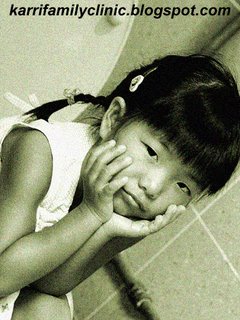 Diarrhoea and vomiting in the child is one of those things every parent has to go through. It is important that you know some basic things about diarrhoea so that you can approach the problem with confidence.
Diarrhoea and vomiting in the child is one of those things every parent has to go through. It is important that you know some basic things about diarrhoea so that you can approach the problem with confidence.What is Diarrhoea?
It is an infection of the bowel where there is frequent passage of loose watery stools. It may or may not be accompanied by vomiting. Most diarrhoeas are caused by viruses and usually lasts for 2 to 4 days. Occasionally, it may go on for 10 days.
What you should know about diarrhoea.
- The most serious problem is loss of water (dehydration) and loss of minerals such as sodium chloride and potassium. Dehydration can be prevented by increasing the amount of liquids for your child.
- For most cases, antibiotics are not necessary. The doctor will be able to advise you on this.
- Vomiting is more serious then the diarrhea itself because it prevents the child from drinking enough fluids and so the child becomes dehydrated. Medications will be prescribed for you to prevent vomiting.
Diarrhoea becomes an emergency when there is too much loss of fluid. You can recognize this by the child becoming listless, always drowsy, very dry tongue and skin, pallor and passing very little urine. You will need to bring him to see the doctor ASAP.
What you should do at home.
If your child is less than a year old and is being breast fed, continue to breast feed your baby.
If your child is on formula, this is what you should do:
- Discontinue formula feeding for 24 hours. You can feed your child rice water to allow his digestive tract to rest. Offer the same amount of rice water as the usual formula feeds.
- Alternatively, you can offer your child soy formula feeds
- Do not offer ½ strength milk feed if your child is less than 6 months old
- Do not feed your baby water only, you can offer oral rehydration salts.
- Start the formula feeds again when the nature of the stools improve.
- Stop solids & offer fluids to your child
- After the nature & frequency of the stools improve, you can slowly reintroduce the normal feeds
- Avoid giving any milk products eg, yoghurt, yakult, cheese, to your child until 2 days after the diarrhoea has stopped
- If your child is vomiting, you can give him a trial of small frequent clear feeds such as rice or barley water. For example, give 10 to 15 mls of fluids every half to 1 hour. If he can tolerate this, you can increase the volume by 10 to 15 mls.
- It is dangerous to use anti-diarrhoea drugs to stop the diarroea in young children. It is safer to let them have diarrhoea but ensure that they do not get dehydrated by giving them lots of fluids
- Rehydrate with rice water or oral rehydration salts rather than plain water as the abosorbtion is better.
- Vomiting is dangerous because the child will not be able to drink fluids and will rapidly become dehydrated. You should seek medical help if you are unsure
- Contrary to popular belief, you should give more fluids when there is more diarrhoea. Some parents believe that the more fluids you cause more diarrhoea. This is not correct and may result in severe dehydration which may cause multiple organ damage.
- Some diarrhoeas may be due to milk intolerance, if suspected, you should check with your doctor.
- When changing diapers or handling your child, make sure you wash your hands because most diarrhoeas are caused by viruses which are easily spread to the rest of the family.
- Young infants dehydrate quickly, so it is advisable to seek medical help sooner.
- Yellow and green stools are quite common. What you have to worry about are jet black and bloody red stools.

5 comments:
This is very useful. Thank you for the effort to write this blog. Keep it up.
Aiyo.. Gwendal got the opposite prob. I think the change in diet is causing her stool to be hard.
I do give her a serving of fruits everyday and veg in every meal. She drinks about 700ml of Milk / Water a day.
Anything else I can do to help her ease her motion?
First of all, you have to be sure that there is a problem in the first place. Not eveyone needs to go to the toilet everyday. But if the stools are still very hard and like pellets, then the doctor may prescribe a laxative. I will write a longer article on constipation in the near future.
I was told taking Probiotics can help to stop diarrhea. Is this true? What function does the Probiotics serve in this case?
The theory is that the good bacteria bind to the intestinal walls and displaces the viruses that cause diarrhoea. It works to a certain extent. The good thing is that it does quite safe.
Post a Comment